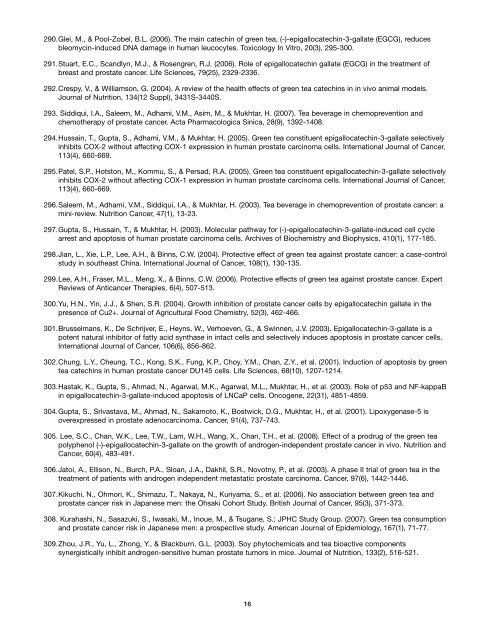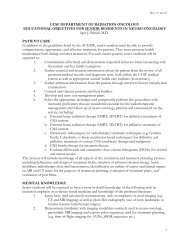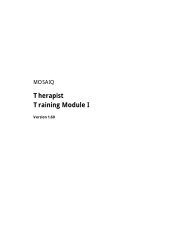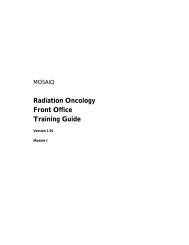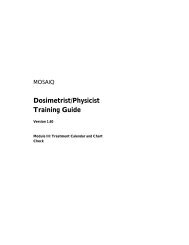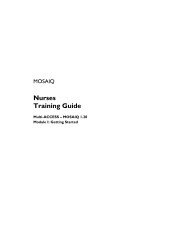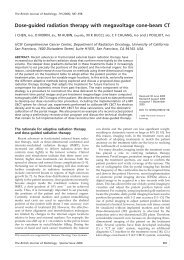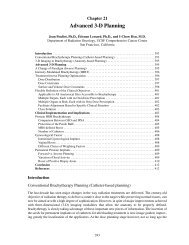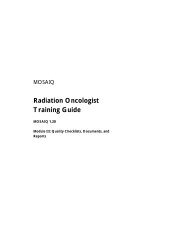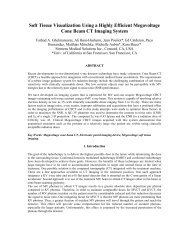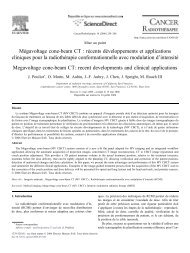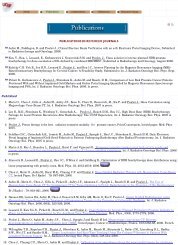Nutrition Prostate Cancer References - UCSF Radiation Oncology
Nutrition Prostate Cancer References - UCSF Radiation Oncology
Nutrition Prostate Cancer References - UCSF Radiation Oncology
You also want an ePaper? Increase the reach of your titles
YUMPU automatically turns print PDFs into web optimized ePapers that Google loves.
290. Glei, M., & Pool-Zobel, B.L. (2006). The main catechin of green tea, (-)-epigallocatechin-3-gallate (EGCG), reduces<br />
bleomycin-induced DNA damage in human leucocytes. Toxicology In Vitro, 20(3), 295-300.<br />
291. Stuart, E.C., Scandlyn, M.J., & Rosengren, R.J. (2006). Role of epigallocatechin gallate (EGCG) in the treatment of<br />
breast and prostate cancer. Life Sciences, 79(25), 2329-2336.<br />
292. Crespy, V., & Williamson, G. (2004). A review of the health effects of green tea catechins in in vivo animal models.<br />
Journal of <strong>Nutrition</strong>, 134(12 Suppl), 3431S-3440S.<br />
293. Siddiqui, I.A., Saleem, M., Adhami, V.M., Asim, M., & Mukhtar, H. (2007). Tea beverage in chemoprevention and<br />
chemotherapy of prostate cancer. Acta Pharmacologica Sinica, 28(9), 1392-1408.<br />
294. Hussain, T., Gupta, S., Adhami, V.M., & Mukhtar, H. (2005). Green tea constituent epigallocatechin-3-gallate selectively<br />
inhibits COX-2 without affecting COX-1 expression in human prostate carcinoma cells. International Journal of <strong>Cancer</strong>,<br />
113(4), 660-669.<br />
295. Patel, S.P., Hotston, M., Kommu, S., & Persad, R.A. (2005). Green tea constituent epigallocatechin-3-gallate selectively<br />
inhibits COX-2 without affecting COX-1 expression in human prostate carcinoma cells. International Journal of <strong>Cancer</strong>,<br />
113(4), 660-669.<br />
296. Saleem, M., Adhami, V.M., Siddiqui, I.A., & Mukhtar, H. (2003). Tea beverage in chemoprevention of prostate cancer: a<br />
mini-review. <strong>Nutrition</strong> <strong>Cancer</strong>, 47(1), 13-23.<br />
297. Gupta, S., Hussain, T., & Mukhtar, H. (2003). Molecular pathway for (-)-epigallocatechin-3-gallate-induced cell cycle<br />
arrest and apoptosis of human prostate carcinoma cells. Archives of Biochemistry and Biophysics, 410(1), 177-185.<br />
298. Jian, L., Xie, L.P., Lee, A.H., & Binns, C.W. (2004). Protective effect of green tea against prostate cancer: a case-control<br />
study in southeast China. International Journal of <strong>Cancer</strong>, 108(1), 130-135.<br />
299. Lee, A.H., Fraser, M.L., Meng, X., & Binns, C.W. (2006). Protective effects of green tea against prostate cancer. Expert<br />
Reviews of Anticancer Therapies, 6(4), 507-513.<br />
300. Yu, H.N., Yin, J.J., & Shen, S.R. (2004). Growth inhibition of prostate cancer cells by epigallocatechin gallate in the<br />
presence of Cu2+. Journal of Agricultural Food Chemistry, 52(3), 462-466.<br />
301. Brusselmans, K., De Schrijver, E., Heyns, W., Verhoeven, G., & Swinnen, J.V. (2003). Epigallocatechin-3-gallate is a<br />
potent natural inhibitor of fatty acid synthase in intact cells and selectively induces apoptosis in prostate cancer cells.<br />
International Journal of <strong>Cancer</strong>, 106(6), 856-862.<br />
302. Chung, L.Y., Cheung, T.C., Kong, S.K., Fung, K.P., Choy, Y.M., Chan, Z.Y., et al. (2001). Induction of apoptosis by green<br />
tea catechins in human prostate cancer DU145 cells. Life Sciences, 68(10), 1207-1214.<br />
303. Hastak, K., Gupta, S., Ahmad, N., Agarwal, M.K., Agarwal, M.L., Mukhtar, H., et al. (2003). Role of p53 and NF-kappaB<br />
in epigallocatechin-3-gallate-induced apoptosis of LNCaP cells. Oncogene, 22(31), 4851-4859.<br />
304. Gupta, S., Srivastava, M., Ahmad, N., Sakamoto, K., Bostwick, D.G., Mukhtar, H., et al. (2001). Lipoxygenase-5 is<br />
overexpressed in prostate adenocarcinoma. <strong>Cancer</strong>, 91(4), 737-743.<br />
305. Lee, S.C., Chan, W.K., Lee, T.W., Lam, W.H., Wang, X., Chan, T.H., et al. (2008). Effect of a prodrug of the green tea<br />
polyphenol (-)-epigallocatechin-3-gallate on the growth of androgen-independent prostate cancer in vivo. <strong>Nutrition</strong> and<br />
<strong>Cancer</strong>, 60(4), 483-491.<br />
306. Jatoi, A., Ellison, N., Burch, P.A., Sloan, J.A., Dakhil, S.R., Novotny, P., et al. (2003). A phase II trial of green tea in the<br />
treatment of patients with androgen independent metastatic prostate carcinoma. <strong>Cancer</strong>, 97(6), 1442-1446.<br />
307. Kikuchi, N., Ohmori, K., Shimazu, T., Nakaya, N., Kuriyama, S., et al. (2006). No association between green tea and<br />
prostate cancer risk in Japanese men: the Ohsaki Cohort Study. British Journal of <strong>Cancer</strong>, 95(3), 371-373.<br />
308. Kurahashi, N., Sasazuki, S., Iwasaki, M., Inoue, M., & Tsugane, S.; JPHC Study Group. (2007). Green tea consumption<br />
and prostate cancer risk in Japanese men: a prospective study. American Journal of Epidemiology, 167(1), 71-77.<br />
309. Zhou, J.R., Yu, L., Zhong, Y., & Blackburn, G.L. (2003). Soy phytochemicals and tea bioactive components<br />
synergistically inhibit androgen-sensitive human prostate tumors in mice. Journal of <strong>Nutrition</strong>, 133(2), 516-521.<br />
16


